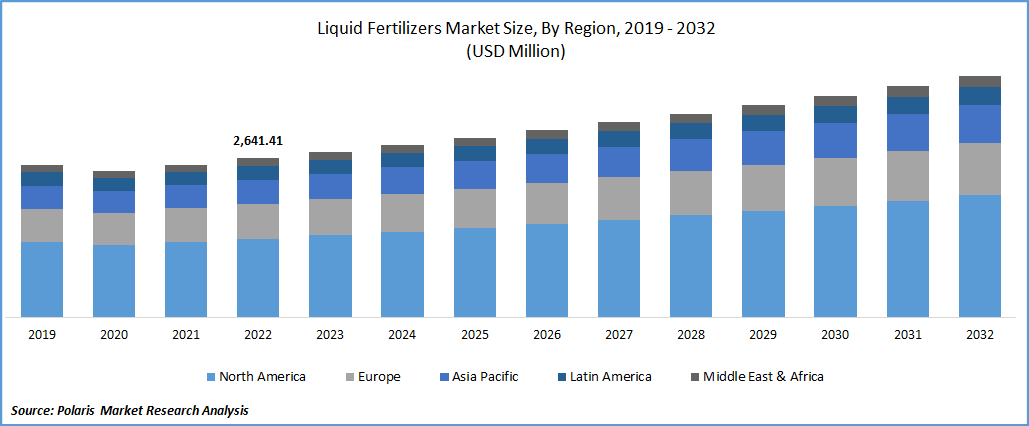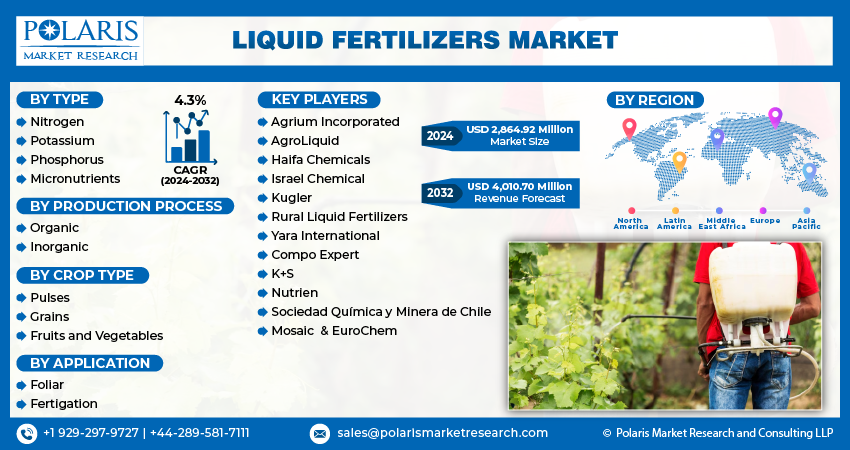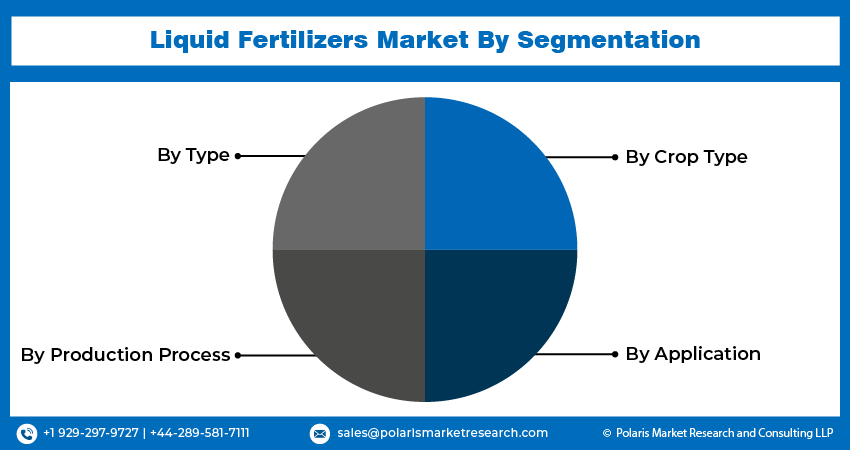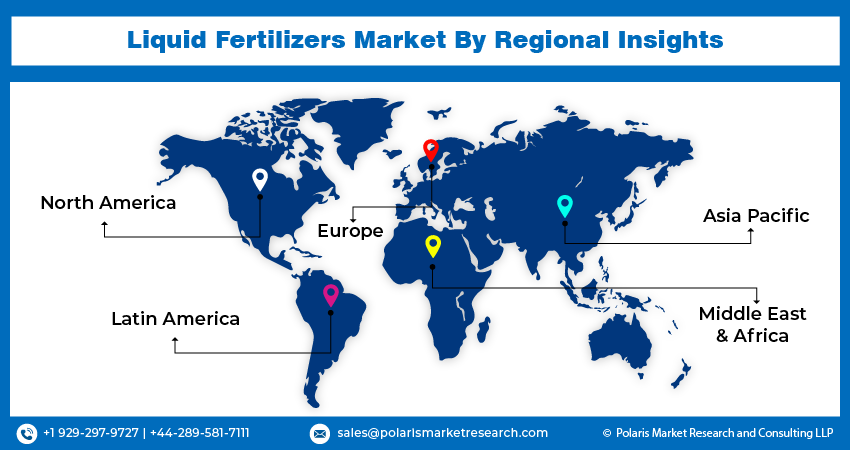
Liquid Fertilizers Market Share, Size, Trends, Industry Analysis Report, By Type (Nitrogen, Potassium, Phosphorus, Micronutrients); By Production Process; By Crop Type; By Application; By Region; Segment Forecast, 2024 - 2032
- Published Date:Jan-2024
- Pages: 116
- Format: PDF
- Report ID: PM3371
- Base Year: 2023
- Historical Data: 2019-2022
Report Outlook
The global liquid fertilizers market was valued at USD 2,750.5 million in 2023 and is expected to grow at a CAGR of 4.3% during the forecast period. The growing demand for food driven by the increasing population worldwide is fueling the growth of the liquid fertilizers market as farmers look for more efficient and effective ways to increase crop yields and improve soil health. Liquid fertilizers can be easily applied to crops using irrigation systems, which allows for more precise and efficient application, leading to better crop yields. Additionally, plants can quickly absorb liquid fertilizers, resulting in faster growth and development.

To Understand More About this Research: Request a Free Sample Report
Furthermore, liquid fertilizers can be formulated to provide a wide range of essential nutrients that plants require for optimal growth, which makes them versatile and effective tools for farmers. By 2050, food production will need to expand by 70% due to the growing world population, putting pressure on food quality standards. If the population reaches 9.1 billion by 2050, the Food and Agriculture Organization of the United Nations (FAO) predicts that global agriculture production will rise by nearly 70%. This will further fuel the growth of the market in the coming years.

Industry Dynamics
Growth Drivers
The adoption of modern farming practices, such as precision farming, fertigation, and hydroponics, is increasing. These techniques require the use of liquid fertilizers for the efficient delivery of nutrients to the crops. Many governments are promoting sustainable agriculture practices, including using liquid fertilizers like India. Ministry of Agriculture and Farmers Welfare announced the Mission of organic value chain development for the northeast region through Farmer Producer Organizations (FPOs); this initiative promotes the development of specialty crops organically certified by a third party in the northeastern region, emphasizing exports. This drives the growth of the liquid fertilizers market as farmers seek more sustainable and precise fertilization methods to meet the growing demand for organic produce.
Report Segmentation
The market is primarily segmented based on type, production process, crop type, application and region.
|
By Type |
By Production Process |
By Crop Type |
By Application |
By Region |
|
|
|
|
|
To Understand the Scope of this Report: Speak to Analyst
Nitrogen Segment is Expected to Witness Higher Growth Rate in Coming Years
The nitrogen segment is projected to experience a higher growth rate in the coming years. Plants can absorb liquid nitrogen fertilizers through their leaves, stems, and roots. They can be applied more efficiently and effectively, resulting in better plant growth and higher yields. These fertilizers are often easier to handle and apply than dry fertilizers, which can be bulky and difficult to transport. The International Fertilizer Association (IFA) predicts that by 2025, global nitrogen fertilizer use will increase by 0.2% a year. This will fuel the growth of the market in the years to come.
Organic Segment is Projected to Witness Significant Growth in the Study Period
The organic segment is expected to have significant growth in the liquid fertilizers market. Organic liquid fertilizers are made from natural sources and are free from synthetic chemicals, making them a popular choice among farmers and consumers who are concerned about the environment and the health of their crops. One of the main advantages of organic liquid fertilizers is that they are rich in micronutrients and other essential plant nutrients. These nutrients are derived from natural sources such as compost, manure, and plant extracts, which can improve soil health and provide long-term benefits to the crops.
Fruits and Vegetables Segment is Expected to Hold the Largest Market Share in Projected Period
The fruits and vegetable segment is projected to witness a higher market share in the study period. Liquid fertilizers are becoming increasingly popular among farmers and growers of fruits and vegetables because of their advantages over traditional dry fertilizers. These fertilizers can be applied more precisely and evenly than dry fertilizers. This is especially important for crops such as fruits and vegetables, which require uniform nutrient application for optimal growth and development. Liquid fertilizers can be customized to meet the specific needs of different crops and growing conditions. This means that farmers and growers can adjust the nutrient content of the fertilizer to suit the requirements of other fruit and vegetable crops.
Fertigation Segment is Expected to Witness Significant Revenue Share During Forecast Period
The fertigation segment is projected to have a significant revenue share. Fertigation is a method of applying liquid fertilizers through irrigation systems, and it is becoming an increasingly popular technique among farmers and growers. This technique allows for precise and efficient application of liquid fertilizers. The fertilizer is injected directly into the irrigation system, which delivers the fertilizer solution to the plant's roots in a controlled manner. This reduces the risk of over- or under-fertilization, leading to improved plant growth, higher yields, and better-quality crops. Fertigation can save water and fertilizer, making it a more sustainable and cost-effective option for farmers and growers.

APAC Is Expected to Witness Higher Growth Rate in the Study Period
APAC is projected to witness a higher growth rate in the study period. The growing population and increasing food demand in countries such as China and India are driving the growth of the agriculture industry, which is, in turn, boosting the demand for liquid fertilizers. In addition, the adoption of modern farming practices, such as precision farming and fertigation, is increasing in the region, driving the demand for liquid fertilizers. Furthermore, the increasing awareness about the benefits of liquid fertilizers, such as higher nutrient uptake, better crop quality, and reduced environmental impact, is expected to fuel the growth of the liquid fertilizers market in the region. The adoption rate of precision farming technologies is highest in Southern Asia, India, which includes Sindh and Punjab in Pakistan and Punjab, Rajasthan, Haryana, and Gujarat.
North America is one of the largest markets for liquid fertilizers, with the United States being the major contributor to the region's revenue share. The demand for liquid fertilizers in North America is driven by adopting modern farming practices, increasing awareness about the benefits of liquid fertilizers, and the availability of advanced farming technologies. In addition, the presence of major liquid fertilizer manufacturers in the region contributes to the market's growth. The government in North America provides subsidies and incentives to farmers and growers to promote the agriculture industry. In 2022, USDA Announced Plans for a $250 Million investment to promote novel fertilizer made in the United States, giving US farmers more choices in the market. This is driving the adoption of modern farming practices and boosting the demand for liquid fertilizers.

Competitive Insight
Some of the major players operating in the global market include Agrium Incorporated, AgroLiquid, Haifa Chemicals, Israel Chemical, Kugler, Rural Liquid Fertilizers, Yara International, Compo Expert, K+S, Nutrien, Sociedad Química y Minera de Chile, Mosaic & EuroChem.
Recent Developments
- In March 2023, Haifa created the MultiMatch web application to aid producers in optimizing the nutrition of Multicote. It proposes fertilizer formula and application rate with crop input, soil type, and climate conditions.
- In November 2019, IFFCO launched its nanotechnology-based products, including nano zinc, nano copper, and nano nitrogen, for on-field testing to reduce the use of chemical fertilizers and increase farmer income.
Liquid Fertilizers Market Report Scope
|
Report Attributes |
Details |
|
Market size value in 2024 |
USD 2,864.92 million |
|
Revenue forecast in 2032 |
USD 4,010.70 million |
|
CAGR |
4.3% from 2024 - 2032 |
|
Base year |
2023 |
|
Historical data |
2019 - 2022 |
|
Forecast period |
2024 - 2032 |
|
Quantitative units |
Revenue in USD million and CAGR from 2023 to 2032 |
|
Segments covered |
By Type, By Production Process, By Crop Type, By Application, By Region |
|
Regional scope |
North America, Europe, Asia Pacific, Latin America, Middle East & Africa |
|
Key companies |
Agrium Incorporated, AgroLiquid, Haifa Chemicals, Israel Chemical, Kugler, Rural Liquid Fertilizers, Yara International, Compo Expert, K+S, Nutrien, Sociedad Química y Minera de Chile, Mosaic & EuroChem. |
FAQ's
The liquid fertilizers market report covering key segments are type, production process, crop type, application and region.
Liquid Fertilizers Market Size Worth $4,010.70 Million By 2032.
The global liquid fertilizers market expected to grow at a CAGR of 4.3% during the forecast period.
Asia Pacific is leading the global market.
key driving factors in liquid fertilizers market are papid growth in greenhouse vegetable production.
